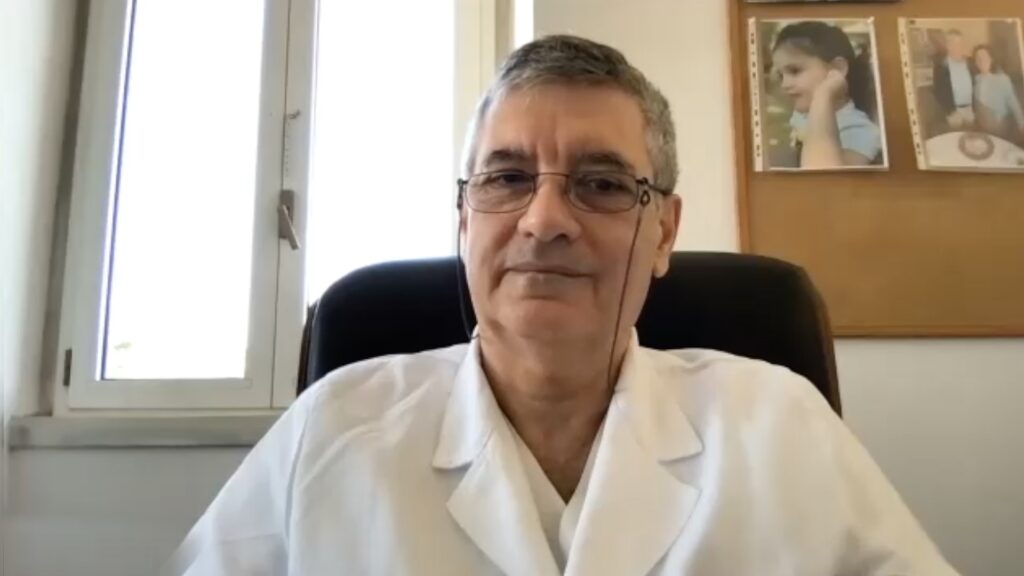The phase 2 WILLOW trial (NCT03218917) investigated the efficacy, safety, tolerability, and PK of brensocatib in patients with non-cystic fibrosis bronchiectasis. We were delighted to speak with Dr Mark Metersky (UConn Health, Farmington, CT, USA) to learn more around his subgroup analysis looking at brensocatib efficacy by disease severity.
The abstract ‘Outcomes of Patients With Bronchiectasis by Disease Severity: Subgroup Analysis From the Brensocatib WILLOW Study.‘ (Abstract number: 808) was presented at ATS 2023, 19-24 May 2023.
Questions
- What is the mechanism of action of brensocatib? (0:36)
- Please could you give us a brief overview of the findings from the phase 2 WILLOW trial? (1:10)
- What were the aims, design and findings of your subgroup analysis looking at patients by disease severity? (1:59)
- What are the next steps for the clinical development of brensocatib? (3:02)
Disclosures: Mark Metersky discloses consulting for Insmed and Tactile; receiving grant/research support from Insmed and receiving reimbursement for DSMB membership from AN2 and Renovion.
Support: Interview and filming supported by Touch Medical Media Ltd. Interview conducted by Victoria Jones.
Filmed in coverage of the ATS Annual Meeting.
Click here for more content on bronchiectasis.
Transcript
What is the mechanism of action of brensocatib? (00:35)
Brensocatib is a DPP1 dipeptidyl peptidase inhibitor and what that enzyme, DPP1, does is it activates neutrophil serine proteases, such as neutrophil elastase, while they are in the white blood cell maturing in the bone marrow. So, DPP1 inhibits neutrophil elastase activity.
Please could you give us a brief overview of the findings from the phase 2 WILLOW trial? (01:09)
So, this was a trial that enrolled about two hundred and fifty patients with bronchiectasis and tested two doses of brensocatib against placebo in their ability to delay exacerbations of bronchiectasis. So, time to exacerbation of bronchiectasis was the primary endpoint, and the results demonstrated that both doses of brensocatib inhibited bronchiectasis exacerbations compared to placebo. So, patients had a longer time till exacerbation and overall fewer exacerbations when they were on drug. Interestingly, both doses, the ten and twenty-five milligram daily dose, had similar effects.
What were the aims, design and findings of your subgroup analysis looking at patients by disease severity? (02:00)
Well, we wanted to see if there was a difference in effect based upon the severity of bronchiectasis. You could theorize that it might work not as well for patients with severe bronchiectasis because of the overwhelming amount of inflammation that’s seen in those patients, or you might theorize that it wouldn’t work as well in patients with mild bronchiectasis because perhaps inflammation was less relevant to those patients’ exacerbations. Maybe it was purely infection that caused those exacerbations. So we went into it, at least I did, not really with any specific bias or prediction as to what the results would show and what we found was that the effect in preventing exacerbations was independent of the severity of bronchiectasis, as defined by the bronchiectasis severity index.
What are the next steps for the clinical development of brensocatib? (03:03)
There’s currently a phase 3 study that has enrolled over sixteen hundred patients with bronchiectasis, with a very similar study design as to the phase 2 study – two doses of brensocatib comparing to placebo, with the endpoint being exacerbations again. That study completed enrolment a few months ago, and it’s a year-long study approximately. So, hopefully, we’ll have data in a year and a half or so and of course, further development will be depending upon those results.
Subtitles and transcript are autogenerated







